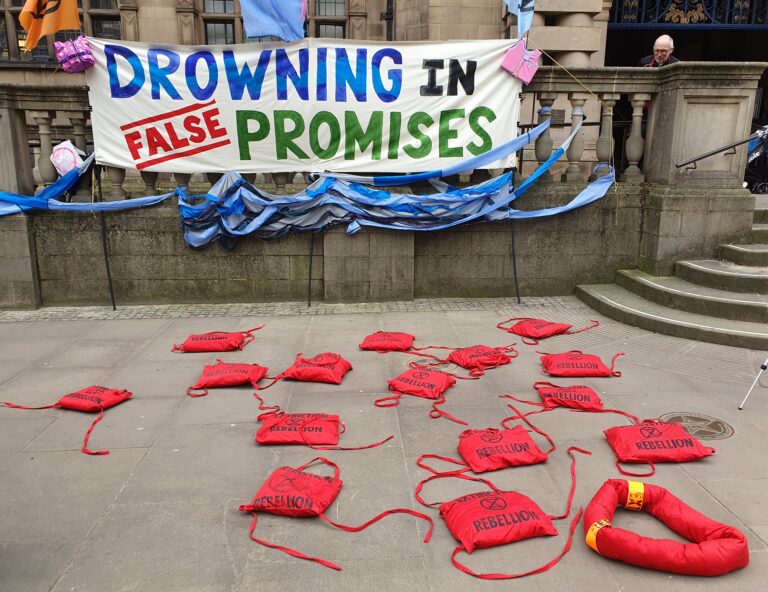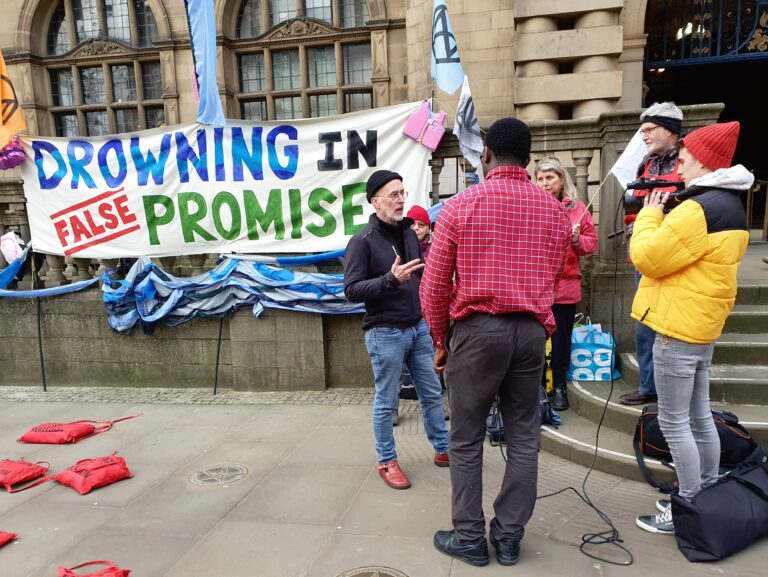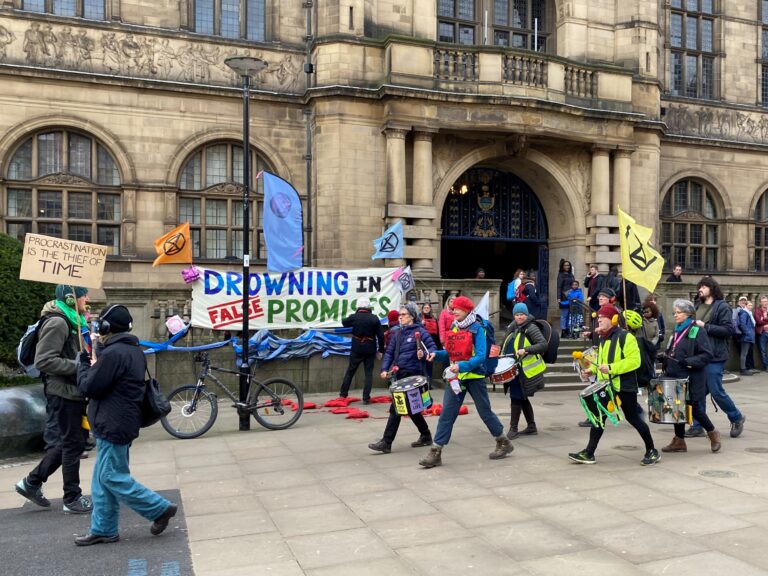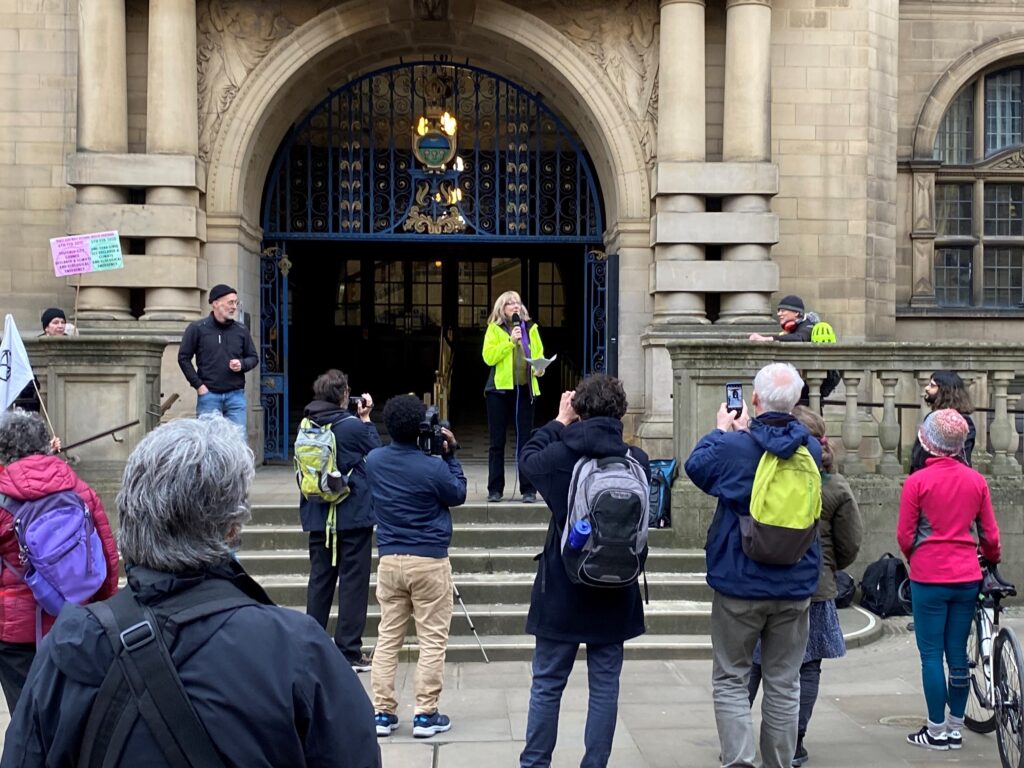Campaigns
Campaigners tell Sheffield City Council to "be ambitious" in response to the climate emergency
South Yorkshire Climate Alliance, together with other local climate groups, marked the 4th anniversary of Sheffield City Council’s declaration of a Climate Emergency by calling on the Council to do more to tackle climate change.
Our petition – calling on Sheffield City Council to accelerate its response to the climate emergency – was presented at the full Council meeting on Monday 20 February.
Before the meeting, local campaigners and climate activists gathered outside the Town Hall to tell Councillors that progress has been too slow. Sheffield XR’s samba band performed and campaigners wore life jackets to symbolise that they were “drowning in promises”.
We heard from speakers both from campaign groups and from the Labour and the Green parties – for details of their speeches, see below.
When presenting the petition at the meeting, Geoff Cox, for South Yorkshire Climate Alliance, told Councillors:
Our petition draws attention to this month being the fourth anniversary of Sheffield City Council declaring a climate emergency.
This should have been an occasion to celebrate all the progress we had made – four years of concerted effort on carbon reductions, four years of concerted effort on nature recovery, four years of concerted effort in engaging with the city’s residents on what more needs to be done.
But sadly it has been four years where precious little concrete action has been taken. A clear agenda was set out in the Arup Report in early 2021, but was not acted upon directly. A slim 10 point plan was unveiled 15 months ago, but has still not resulted in a single route map being produced, and no report has yet been produced on the meeting with the city’s voluntary and community groups held at St Mary’s a full 3 months ago. Plenty of words and promises, but no urgency whatsoever in delivery.
And urgency is what this petition calls for. We have seen how the city responded to an emergency in the case of the Covid pandemic, and that is the scale and pace of the response needed now to achieve the City’s 2030 target – but we don’t see that urgency at all.
I need to say two more things:
We fully recognise that the national Government has failed to produce the policies, the infrastructure and the funding needed to allow Sheffield and other councils to properly play their part in the national climate emergency effort – and we will be making our voices heard at the national climate demonstration in London in April on behalf of Sheffield and South Yorkshire to say exactly that;
But, having said this, we also need to point out that other councils facing the same kind of financial difficulties have done more than Sheffield, and Sheffield can learn from them. The Friends of the Earth and Ashden case studies have been referred to several times before, and I feel obliged to refer to them again here.
The petition ends by calling on this City Council to accelerate its response to the climate emergency – and that response needs to be in the form of concrete actions, not just promises.




The Speakers:
Dr Mike Tomson, from Greener Practice, spoke first and expressed his frustration with the lack of action in Sheffield compared to other local authorities. He said:
“I’m of an age where I remember a lovely song “You’ve done too much, much too young”. And I think it’s a reality that the council has done far too little far too late. We really have a climate emergency which we haven’t responded to. We have a plan to have a plan.”
He acknowledged that there is a lack of funding for local authorities, but gave examples of other councils who, with the same lack of funding, have been doing more, including: Nottingham, with car park charging used to improve local transport; Wiltshire who are making homes warmer; Dundee which has renewable energy initiatives.
He called on Sheffield to have a plan which impacts on renewables, on ensuring that our homes are all warmer, and on making sure that we have less air pollution – which kills one person every 8 minutes in the UK.
For the Labour group, Councillor Minesh Parekh agreed that much more needs to be done, much more quickly. He said:
“We know that the climate and ecological emergency is the greatest threat we all face. We want to see a full mobilisation of the Council to meet this threat. This is a challenge that can’t be solved by one political party, which is why we’ve established the cross-party working group to cohere efforts to tackle the climate crisis.
He also pointed out steps the council are taking, including the clean air zone, and community wealth building strategy. He said that real progress will need a change of government nationally, the reversal of austerity, and for local authorities to be given the resources they need to decarbonise housing, to generate renewable energies at scale, to own and provide our own buses and run them according to need rather than profit. He also said that “We can’t do everything we need to alone… I’m working within the council, as I’m sure our Green partners are too… but we can’t neglect the national and international picture.”
Councillor Christine Gilligan, for the Greens, also acknowledged that Sheffield City Council has been too slow. She said:
“I will acknowledge here, climate change is the biggest challenge facing humanity. And all of us, including Sheffield City Council, have wasted a lot of time failing to act. But as Minesh said, it is not just Sheffield City Council, it is across the world. The social and economic upheavals will only increase if we don’t start to act soon.”
She too spoke about the steps Sheffield is taking, while drawing attention to the 29% cut in income over the last 10 years. She said that transport makes up 26% of the carbon emissions in Sheffield, and the easiest and quickest way to cut these emissions is to reduce the amount of car journeys. To do that they have introduced low traffic neighbourhoods and active travel incentives to increase opportunities for walking and cycling across the city. However, she said, the Council face protest when they bring in these kind of measures.
She said the same thing has happened with the buses: “Bus operators tell us one of the reasons the buses are not profitable is the congestion that reduces their ability to meet their journey times. We tried to put in bus lanes that make it easier for buses to move, so we might get some more bus services, but again we meet with lots of protests”. She told those present that “we need all of you to work with us – to help us to reduce car journeys, to walk and cycle more, to create warm homes and green jobs” called on those present to “support us and [spread] the message of how we can change things.”
Dawn Spier, from Nature Recovery Sheffield, said that the UK is one of the most nature-depleted countries in the world. After declaring a nature emergency in 2021 the council made a commitment to create a nature emergency action plan for Sheffield, and made promises to relax mowing regimes and create meadows for bees. She asked the crowd to join her in telling the council that “promises are not enough, this is an emergency, we need action now”.
Richard Teasdale, from Sheffield Greenpeace, said that he was here to talk about ambition and opportunity, “because Sheffield City Council can fight the cost-of-living crisis and the climate crisis at the same time…” He said that both the causes and the solutions of the cost-of-living crisis and the climate crisis are the same – fossil fuels are nine times more expensive than renewables – and the solutions are the same too. He said that councils all over the country are already taking action: in Manchester they are training up a retrofit workforce that will create 55,000 jobs by 2040; in Liverpool they are improving insulation in private rented accommodation using a licencing scheme; in North East Derbyshire retrofitting council homes with heat pumps and insulation. He called on Sheffield City Council to be ambitious, saying that “this change, this revolution is already happening and we in Sheffield want to be proud, we want to be climate leaders.”
Martin Mayer from Sheffield TUC agreed that the actions we need for climate are the same as the actions we need to confront the cost-of-living crisis. He said:
“We’ve got really serious poverty here in this country. We’ve got people on desperately low incomes, whether it’s on Universal Credit, on low wage jobs, within a cost-of-living crisis, fundamentally caused by the exploitation of our fossil fuels industry by the big energy companies who are paying virtually no taxes, by the way, and making absolutely massive profits, which is shifting the wealth from the poor to the rich as we speak.”
He called for massive public spending investment: “if we invested in that green transformation, we could be creating thousands, tens of thousands, of new green jobs; we could be reducing the cost of living for ordinary working people in their homes… We could be investing in renewable energy. We could be transforming our public transport system, getting people out of their cars, onto our buses and trams. That’s what we need to do.”
